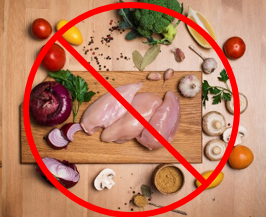Food Poisoning
Food poisoning, also known as a food borne illness, is caused by eating food that has been contaminated. This contamination can occur if the food is handled incorrectly, left out too long after it is cooked, or not cooked properly to kill of all the bad bacteria that is on the food you will consume. Food poisoning can happen at any point through the foods life cycle. From growing, to harvesting, processing, storing, shipping or preparing. Another very frequent cause is cross contamination, where harmful organisms transfer from one surface to another, being especially troublesome for raw meet. There are a variety of different types of food poisoning but most of them will cause one or more of the following symptoms; nausea, vomiting, watery or bloody diarrhea, abdominal pain and cramps or a fever. These symptoms can start anywhere from a few house after eating the contaminated food to even a few weeks later. Food poisoning, once you start noticing symptoms, can last anywhere from a few hours to several days.

As mentioned above food poisoning is caused from not handling the food correctly or from improper cooking of the food. If the food is not cooked correctly it will not become hot enough to kill off the bacteria that is living on the food. But if cooked properly and the food is left out too long bacteria can begin to grow on the food item again then contaminating the food again. But the food can also get contaminated anytime in the process of the foods life. The most common bacteria to cause food poisoning are; salmonella, Norovirus (Norwalk Virus), Campylobacter, E. coli, Listeria and along with many more. “The federal government estimates that there are about 48 million cases of foodborne illness annually – the equivalent of sickening 1 in 6 Americans each year.” (FDA)

A major way food poisoning is spread is through the “ready serve” meals for frozen entrees. In an article written by The Food Safety Law Firm Marler Clark they talk about a foodborne illness outbreak in Minnesota that was linked to frozen entrees. “The frozen entrees in question contained boneless chicken…” the article states that “…they may take longer to reach a safe, internal cooking temperature of 165 degrees F than Consumers might expect.” (The Food Safety Law Firm) With the consumers having a misunderstanding on how long their ready to serve meal should take cooking it was causing a big outbreak in food poisoning in those who bought this product. With clearer directions and a wide spread knowledge on how to cook the frozen meal or what temperature chicken should be cooked at there would be a decrease in foodborne illness.
While food poisoning can leave you running to the bathroom a few hours after you eat something that was contaminated some of the worst forms of food poisoning can occur after a lengthy period of time. “Microbe have to pass through the stomach and into the intestines and multiply, which means that days can pass before the first symptom presents themselves…” (The Daily Meal) As this can take a while to occur it can be hard to pinpoint when or where you got the foodborne illness from. The Daily Meal continues to talk about if you are served rotting food or anything that smells off your instinct should be not to eat it but “in reality, spoilage bacteria is far less likely to make you sick than pathogenic bacteria.” (TDM) they continue to state that it is hard to know what is safe to eat unless you prepare and make your meal yourself.

“Food Poisoning”; Mayo Clinic; https://www.mayoclinic.org/diseases-conditions/food-poisoning/symptoms-causes/syc-20356230
“Foodborne Illnesses: What You Need to Know”; FDA U.S. Food &Drug; https://www.fda.gov/Food/ResourcesForYou/Consumers/ucm103263.htm
“food poisoning outbreaks”; The Food Safety Law firm Marler Clark; https://www.foodpoisonjournal.com/tags/food-poisoning-outbreaks/
“5 Decidedly Unpleasant Facts About Food Poisoning”; The Daily Meal; https://www.thedailymeal.com/eat/5-decidedly-facts-about-food-poisoning